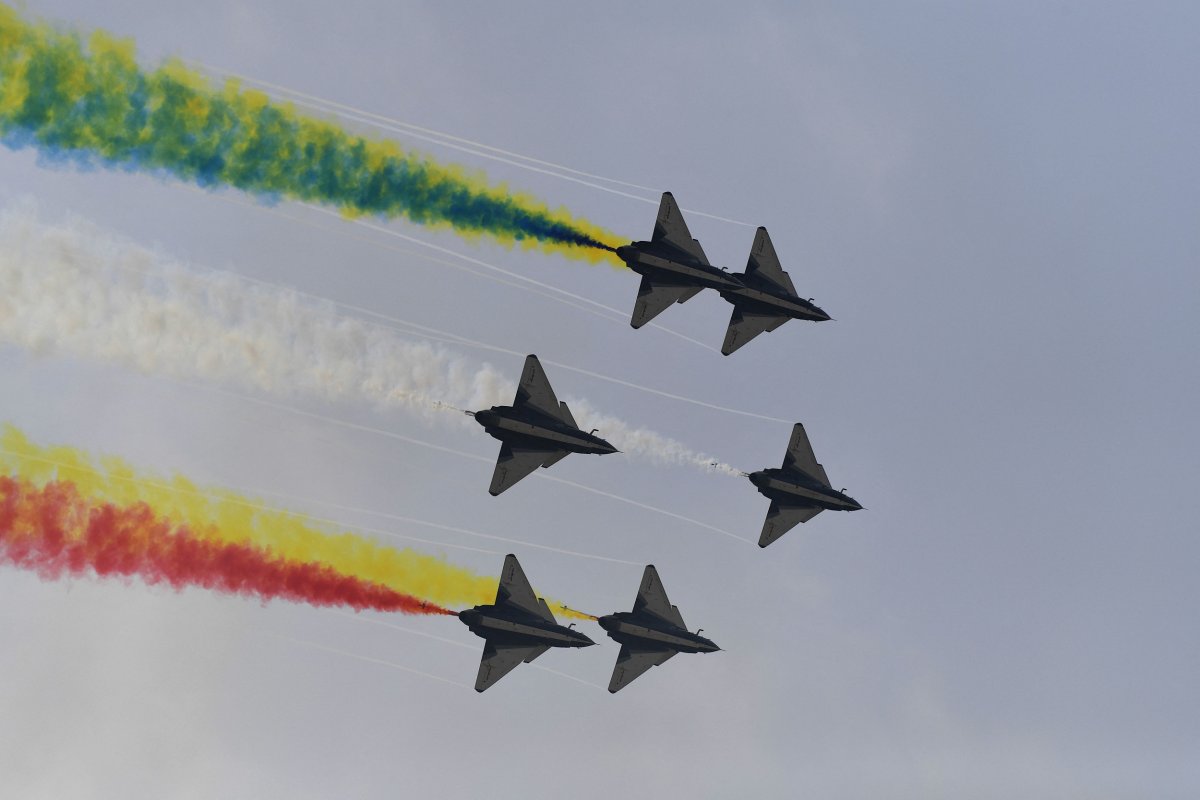A Chinese government official confirmed Wednesday that recent military exercises near Taiwan were intended as warnings to the island's independence supporters and "external forces"—an indirect hint at the United States.
Ma Xiaoguang, a spokesperson for the Taiwan Affairs Office (TAO) in Beijing, spoke after Taiwan's Defense Ministry detected 153 People's Liberation Army warplane sorties into the international airspace southwest of the island, including 150 flights in the span of five days.
It marked an alarming escalation that coincided with China's National Day celebrations on October 1, but Beijing had not specifically linked the PLA missions to any intended audiences until this week.
"The PLA training activities target 'Taiwan independence' splittism and interference by external forces," Ma said at a regular press conference. The maneuvers were a "completely just move" to maintain peace and stability in the Taiwan Strait, he added.
The regular warplane operations near Taiwan began in earnest in March 2019, defense officials on the island said. The dramatic spike in activity earlier in October also happened as American and British carrier groups sailed from the Western Pacific into the South China Sea—a deployment China appeared to perceive as threatening.
Taiwan Defense Minister Chiu Kuo-cheng told legislators last week that cross-strait tensions were now at their "most severe" in the four decades since he enlisted in the military. He assessed that the PLA would possess the capability to invade Taiwan at minimal cost by 2025.

The Biden administration at all levels has backed Taiwan and described China's military flights as destabilizing and risking "miscalculation."
Beijing, however, appears to be alone in pinning heightened tensions on Taiwan's ruling Democratic Progressive Party (DPP), which it claims is pushing for the island's formal independence, despite pledges by Taiwan's leadership to do the opposite.
"If the DPP authorities stubbornly persist and don't stop before it's too late, it will only push Taiwan into a more dangerous situation," said the TAO's Ma.
Faced with Beijing's consistent claim that Taiwan is a Chinese province, Taipei insists it is already a functionally independent state under the formal name the Republic of China, and therefore doesn't see a need to declare independence.
Taiwan President Tsai Ing-wen rebuffed her Chinese counterpart Xi Jinping on Sunday after he had insisted the island's "unification" with the mainland was inevitable. Tsai said her country's future would be decided by its 23.5 million people. The U.S., for its part, continues to support Taiwan's democracy.
On Tuesday, Defense Department spokesperson John Kirby offered a rare clarification of America's "one China" policy and its official position on Taiwan's political status, which it considers to be undetermined.
The American policy is "distinct from Beijing's 'one China' principle, under which the Chinese Communist Party asserts sovereignty over Taiwan," Kirby told reporters at the Pentagon. "We take no position [...] on sovereignty over Taiwan.
"We will continue to support a peaceful resolution of cross-strait issues, consistent with the wishes and best interests of the people of Taiwan," he added. "Our commitment to Taiwan is rock solid and contributes to the maintenance of peace and stability across the strait and within the region, again, in keeping with that 'one China' policy."
The U.S. broke off formal ties with Taiwan's government in 1979, but Washington remains Taipei's strongest international backer, contributing to the island's self-defense capabilities through arms sales and technical assistance.
Uncommon Knowledge
Newsweek is committed to challenging conventional wisdom and finding connections in the search for common ground.
Newsweek is committed to challenging conventional wisdom and finding connections in the search for common ground.
About the writer
John Feng is Newsweek's contributing editor for Asia based in Taichung, Taiwan. His focus is on East Asian politics. He ... Read more
To read how Newsweek uses AI as a newsroom tool, Click here.








